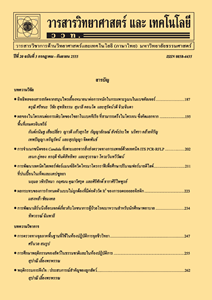ศักยภาพการให้ค่าพลังงานความร้อนของขยะเทศบาล : กรณีศึกษาเทศบาลพรหมโลก
Main Article Content
บทคัดย่อ
การวิจัยครั้งนี้มีวัตถุประสงค์เพื่อประเมินศักยภาพการให้ค่าพลังงานความร้อนจากขยะเผาไหม้ได้และขยะเผาไหม้ไม่ได้ เพื่อเป็นแนวทางแก้ไขปัญหาการจัดการขยะของเทศบาล งานวิจัยได้ศึกษาองค์ประกอบทางกายภาพและทางเคมี หาค่าความร้อนจากขยะเผาไหม้ได้ด้วยเครื่องบอมบ์แคลอรี่มิเตอร์ และการผลิตมีเทนจากขยะเผาไหม้ไม่ได้ด้วยการย่อยสลายมีแบบไร้อากาศสองขั้นตอน ผลการศึกษาพบว่าขยะในเทศบาลพรหมโลกมีปริมาณขยะเฉลี่ย 3.47 ตันต่อวัน มีองค์ประกอบเป็นขยะอินทรีย์ร้อยละ 41.67 พลาสติกร้อยละ 25.83 โดยน้ำหนัก สามารถแบ่งเป็นขยะที่เผาไหม้ได้ ขยะที่เผาไหม้ไม่ได้ และขยะคัดทิ้ง มีค่าร้อยละ 43.33, 48.33 และ 8.33 โดยน้ำหนัก ตามลำดับ ขยะเผาไหม้ได้มีค่าความชื้นร้อยละ 36.94 ของแข็งทั้งหมดร้อยละ 63.06 และของแข็งระเหยทั้งหมดร้อยละ 19.02 องค์ประกอบของขยะที่เผาไหม้ไม่ได้มีค่าความชื้นร้อยละ 77.79 ของแข็งทั้งหมดร้อยละ 22.21 และการผลิตมีเทนที่ได้จากการหมักขยะร่วมกับกล้าเชื้อจุลินทรีย์จากน้ำทิ้งโรงงานสกัดน้ำมันปาล์มดิบ แปรผันปริมาณขยะทั้งหมด 5 ระดับ คือ ความเข้มข้นร้อยละ 3, 5, 7, 9 และ 11 โดยน้ำหนักของขยะเทศบาล พบว่าการย่อยสลายแบบไร้อากาศสองขั้นตอนของเทศบาลพรหมโลกผลิตไฮโดรเจนและผลิตมีเทนได้มากที่สุดความเข้มข้นร้อยละ 3 ของขยะเทศบาล ผลิตมีเทนได้ 114.76 ลูกบาศก์เมตรต่อกิโลกรัมของแข็งระเหย คิดเป็นค่าพลังงานความร้อนได้ 418.63 กิโลวัตต์ชั่วโมงต่อวัน และขยะเผาไหม้ได้มีค่า 2,729.62 กิโลวัตต์ชั่วโมงต่อวัน
Article Details
เอกสารอ้างอิง
Wongchantra, P., Wongchantra, K., Boottarat, S. and Sanprasit, A., 2016, The training manual of recycle waste management for undergraduate students, Environmental Education Programs, Mahasarakham University, Prae-wa Kalasin J. Kalasin Univ. 3(3): 98-112. (in Thai)
Yingyuad, N., 2017, Development of knowledge and awareness in garbage management for students major of agricultural and environmental Education through participation between university, local school and community network, Veridian E-J. Silpakorn Univ. Human. Soc. Sci. Arts 10(1): 770-785. (in Thai)
Kittivitayapong, R., 2019, Competency on integrated municipality solid waste management of people in Prachuap Khirikhan Province, VRU Res. Develop. J. Human. Soc. Sci. 14(1): 298-311. (in Thai)
Pongsiri, T., Toopgrajank, S. and Rungsawanpho, D., 2018, Administration patterns model establishment for collecting and transferring of local municipal solid waste, Veridian E-J. Silpakorn Univ. Human. Soc. Sci. Arts 11(1): 1572-1587. (in Thai)
Pollution Control Department, 2016, Thailand State of Pollution Report 2016, Pollution Control Department, Bangkok, 540 p. (in Thai)
APHA, 1998, Standard Methods for the Examination of Water and Wastewater. 20th Ed., American Public Health Association, American Water Works Association and Water Environmental Federation, Washington DC, 1220 p.
Kiatsiriroat, T., Prasityousil, J., Prasityousil, J., Vorayos, N. and Nanthaphan, A., 2009, Feasibility Study of Waste Management for District Scale Electricity Generation, Faculty of Engineering, Chiangmai University, Chiangmai, 423 p. (in Thai)
Saranrom, K. and Yongcharoen, W., 2015, A case study of a waste processing plant fuel establishment in Nonthaburi municipality, Nonthaburi province, J. Energy Res. 12(2): 36-46. (in Thai)
Hinsui, T., 2013, Alternative: A Study on Municipal Solid Waste Disposal by Plasma Gasification Technology for Energy Recovery, Doctoral Dissertation, Suranaree University of Technology, Nakhon Ratchasima, 243 p. (in Thai)
Drake, M., 2017, Qualitative determination of energy potential and methane veneration from municipal solid waste (MSW) in Dhanbad (India), Energy 123: 386-391.
Khongkliang, P., Kogjan, P. and O-thong, S., 2015, Hydrogen and methane production from starch processing wastewater by thermophilic two-stage anaerobic digestion, Energy Proc. 79: 827-832.
Bumrerpong, P., Penchai, P. and Ongwandee, M., 2014, Effect of organic loading rate on methane production and methane production inhibitors in food waste using a two-stage digester, J. Sci. Technol. Mahasarakham Univ. 33(1): 8-12.
Brown, D., Shi, J. and Li, Y., 2012, Comparison of solid-state to liquid anaerobic digestion of lignocellulosic feedstocks for biogas production, Bioresour. Technol. 124: 379-86.
Lahaman, A., Niyasom, C. and O-thong, S., 2012, Effect of temperature and organic loading on methane production from hydrogenic effluent of oil palm mill wastewater, Thaksin Univ. J. 15(3): 107-115.
Sohgratok, N., 2013, Biogas production from decanter cake of palm oil mill with wastewater from frozen seafood industry, Master’s Thesis, Prince of Songkla University, Songkla, 157 p. (in Thai)
O-Thong, S., Boe, K. and Angelidaki, I., 2012, Thermophilic anaerobic co-digestion of oil palm empty fruit bunches with palm oil mill effluent for efficient biogas production, Appl. Energy 93: 648-654.
O-thong, S. and Mamimin, C., 2014, Enhancement of Hydrogen and Methane Production from Palm Oil Mill Effluent by Two-stage Anaerobic Digestion, Faculty of Science, Thaksin University, Phatthalung, 60 p. (in Thai)
Raktakanit, K., 2015, Organic waste management using anaerobic digestion technology in Thailand, National Defence College of Thailand J. 57(1): 68-81.
Li, Y., Zhou, L.w. and Wang, R.Z., 2017, Urban biomass and methods of estimating municipal biomass resources, Renew. Sustain. Energy Rev. 80: 1017-1030.


